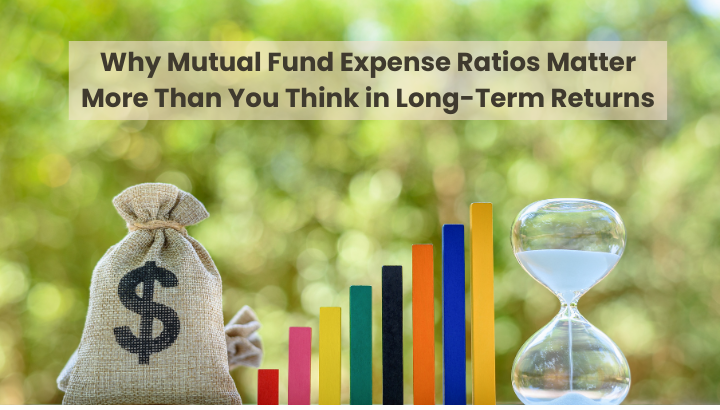When setting up your mutual funds investment in India, you probably focus on returns in the past, fund ratings, or high-profile fund managers. But one factor silently eats into your wealth year after year, which is the expense ratio. How does the expense ratio affect long-term mutual fund returns Over the long run, avoiding it can cost you thousands of rupees, even lakhs in lost returns.
To overcome this loss, let’s understand why mutual fund expense ratios matter more than you think in long-term returns.
What Is Expense Ratio?
An expense ratio is the yearly charge that fund houses charge investors to manage their fund. It appears as the percentage of the fund’s average assets. For example, an expense ratio of 1% means the fund charges ₹1,000 every year for every ₹1 lakh you invest in mutual funds.
Why Should You Care?
Initially, 1% or 2% may not look like a big deal to you. But you need to understand one thing that the power of compounding works both ways. Here’s why the expense ratio matters more than you think:
-
Direct Impact on Returns: The higher the expense ratio, the lower will be your net returns.
-
Long-Term Wealth Erosion: Even a small difference builds up into a large amount over 10 to 20 years.
-
Hidden Opportunity Cost: The money lost because of high expense ratio could have gained more returns if invested somewhere else.
Example of How does the expense ratio affect long-term mutual fund returns
Let’s assume that you invested ₹5 lakh for 20 years regularly in two mutual funds:
-
Fund A: With expense ratio of 2%
-
Fund B: With expense ratio of 0.5%
-
And both Fund A and Fund B earn 12% before expenses.
Returns after 20 years:
-
Fund A: With return of approx. ₹24 lakh
-
Fund B: With returns of approx. ₹32 lakh
You can see that just a difference of 1.5% in expense ratio cost you ₹8 lakh!
Dividend vs Growth Option: Which Mutual Fund Plan to Choose India
How to Check and Compare Expense Ratios
While choosing the best mutual fund portfolio strategy for 2025, make sure that you don’t skip these steps:
-
Make sure to visit AMFI or fund house websites, because expense ratios are listed clearly out there in detail.
-
Don’t forget to compare expense ratios of similar funds i.e., equity vs equity or debt vs debt.
-
Search for direct plans, because they have lower expense ratios as compared to the regular plans.
-
Make sure to check if higher expenses are making sense by giving regular higher returns over time.
Tips to Reduce Expense Ratio Impact
-
Opt for direct plans over regular plans. Because direct plans can save 0.5% to 1% every year.
-
Always choose index funds or ETFs, as they usually have the lowest expense ratios in India.
-
Don’t chase trending thematic funds with high fees, especially from social media unless you are fully convinced.
-
Make sure to review your mutual fund portfolio every 6 months or yearly to pull out expensive underperformers.
Final Thoughts
A smart investor always makes sure that returns matter, but costs matter at the same time too. Expense ratios are one of the few things you can control. Next time you find yourself wondering how to choose the right mutual funds in India, check if the fund’s expense ratio supports the returns.
So, if you are thinking about your mutual funds investment in India for long-term goals, then remember that even small fees saved today mean bigger wealth for tomorrow. You can also refer to SEBI Mutual Fund Guidelines for more investor protection tips.

